People living with HIV in Mumbai receive uninterrupted medication
Story by Vrushali Deshmukh and Ramesh Reddy Allam
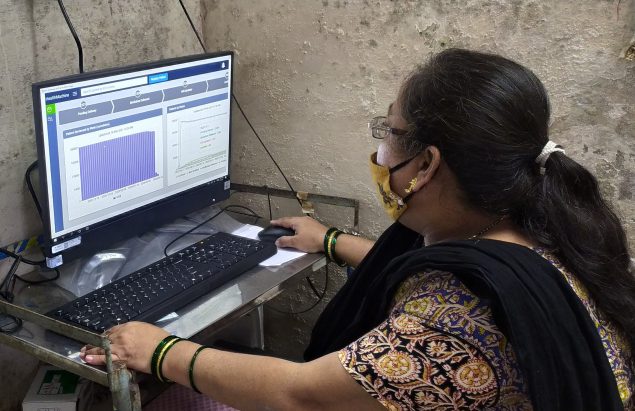
ART Center counsellor updating entries for IMS from ARTMitra Web form. Photo by Dr. Prashant Deshpande, Medical Advisor, I-TECH India.
The COVID-19 pandemic and resulting lockdowns created incredible challenges for people living with HIV (PLHIV) to access services. When India announced a nationwide lockdown in March 2020 to mitigate the spread of COVID-19, delivery of antiretroviral treatment (ART) to PLHIV faced risk of interruption. A potential crisis was prevented with the release and implementation of ARTMitra, a technology platform that ensured HIV treatment continued during the pandemic. The U.S. Centers for Disease Control and Prevention (CDC), under the United States President’s Emergency Plan for AIDS Relief (PEPFAR), partnered with the Mumbai District AIDS Control Society (MDACS) and the National AIDS Control Organization (NACO) to protect the health of PLHIV through the development and implementation of ARTMitra – an interactive voice response system.
While there is no effective cure for HIV, it can be controlled with proper medical care. ART is an essential, lifesaving treatment which can get the HIV virus under control for most people within six months. In the Mumbai metropolis, there are 19 Antiretroviral Therapy Centers (ARTCs) where PLHIV receive ART medicines free of cost, administered by MDACS under the guidance of NACO.
Early into the pandemic, NACO expanded access to multi-month medicine packages, reducing the number of visits a PLHIV would need to make to a clinic during lockdown. ARTMitra also served a key role in connecting PLHIV with counselors who provide assistance and ensure patients remain on treatment.
Early interventions
Providing access to uninterrupted medication remained a priority. Although patients could now collect multi-month medicine packages, concern grew that PLHIV who migrated out of Mumbai during the lockdown would run out of ART medication. As a response, ART distribution was decentralized across priority locations in the community.
Based on location data received from phone calls, 13 additional decentralized community dispensation sites were established. These sites led to the support of an additional 1,660 PLHIV.
Missed medical appointments were another concern for the team. To track missed appointments and get PLHIV back on treatment, MDACS generated a list of nearly 7,500 patients due for a monthly refill. Over ten days, 14 program assistants made phone calls to remind patients of their medication and guide them to nearby centers for pick-up. Supported by implementing partner I-TECH India, the dedicated team reached 47 percent of patients while maintaining call logs and documenting responses for each interaction.
New intervention: Mitra (friend) in need
With nearly 53 percent of clients unreachable by phone, interruption in treatment was likely. To protect the progress made in the HIV response and to ensure continuity of treatment for PLHIV during the COVID-19 pandemic, MDACS, the CDC India country office, and implementing partner I-TECH India developed a new interactive voice response system designed to:
ARTMitra web form has enabled me to do quicker entries of ART refills during the COVID-19 lockdown period …. this has also avoided duplication of our work at grassroot levels.
- Guide PLHIV to services based on their location during lockdown
- ART based on patient location
- Identify needs and respond in real-time to create new community ART refill sites based on patient location
- Ensure real-time medicine stock updates across refill sites using web forms
The team worked with Avegen, a digital health care vendor, to reach more people using a telephonic response system. The newly developed system was named “ARTMitra” (Mitra: a Hindi term meaning friend). Since April 1, 2020, the app-based platform has supported refill planning and ART redistribution during the lockdown.
Tracking and tracing PLHIV with missed appointments is critical for retention efforts toward lifelong ART. ARTMitra succeeded in locating PLHIV with missed appointments and connecting them with a program manager. Based on location data received from phone calls, 13 additional decentralized community dispensation sites were established. These sites led to the support of an additional 1,660 PLHIV who did not initially call the help line.
The web-based form used in the field led to real-time updates for ART stocks and identified low supplies. Due to the automated voice system, time spent by staff trying to reach clients through calls decreased 57 percent allowing the team to prioritize other critical duties and focus on clients who could not easily reach community distribution sites. Counsellor Sheetal from Virar Rural Hospital commented, “ARTMitra web form has enabled me to do quicker entries of ART refills during the COVID-19 lockdown period …. this has also avoided duplication of our work at grassroot levels.”
To ensure program success, MDACS and partners supported a mass media and SMS text message campaign to publicize the app to more than 13,000 PLHIV. The campaign reached 11 percent of the target population through the app, and of those contacted, 87 percent picked up their ART. Based on their location, 31 percent of PLHIV opted to pick up medication from a community distribution site, 19 percent opted for home delivery, and 50 percent opted to visit the nearest ART facility.
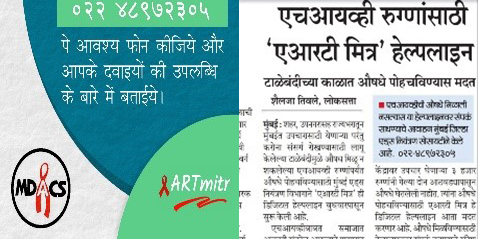
SMS text message campaign promote launch of new app ARTMitra
ARTMitra brings ART to PLHIV
The simplicity of ARTMitra is also its strength. PLHIV who missed appointments received a short SMS text message from the platform on their cell phone. The message was in the local language and listed a helpline number where the interactive voice response system prompted patients to respond to the following:
- Availability of ART medicine with the caller
- Current location (in or outside Mumbai)
- Ability to reach the nearest ART center
A member from the Vasai West community shared her gratitude “thank you MDACS leadership for the excellent initiative as I am able to access the drugs close to my residence.”

ARTMitra reaches patients who’ve missed appointments
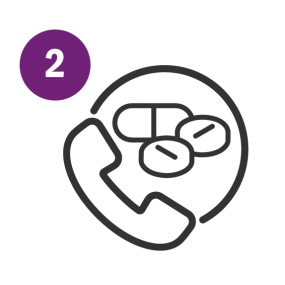
Patients call helpline and request medication
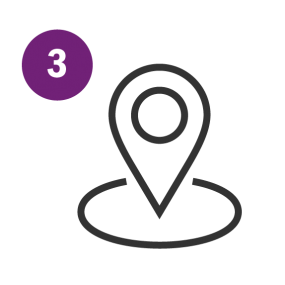
ARTMitra records patient location

Program assistants confirm location and set up medicine pick-ups
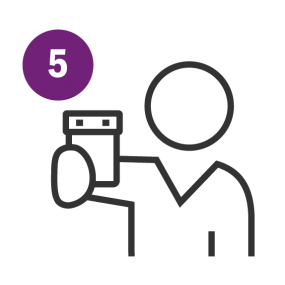
Patients pick up medicine at community site or receive home delivery
Patients can get their HIV medicine either by home delivery or by pick-up at the closest Antiretroviral Therapy Center (ARTC) or decentralized ART sites.

All along the way, the ARTMitra App captures data on location, delivery, and medicine stock at community sites that provides a real-time feedback loop for the program to continuously improve and respond to populations most at risk.
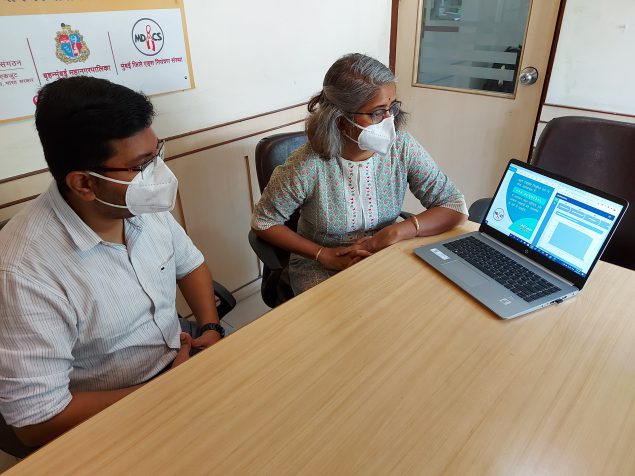
Dr. Shrikala Acharya (right), Additional Project Director, Mumbai District AIDS Society, monitoring the utilization of the ARTMitra App.
Based on a patient’s response to the prompt, I-TECH’s program assistants called the PLHIV to provide further guidance and refer them to the nearest ARTC or specified locations for medication refill. Dispensation details were automatically sent to the ARTCs through a web-based form. Since many PLHIV had migrated out of Mumbai, knowing each community site’s stock status was vital.
The web-based form developed by ARTMitra captured data at community dispensation sites and allowed for real-time updates to the main ARTC. When the state government introduced rigid mobility norms restricting any movement, the I-TECH team mapped out existing non-governmental organizations (NGOs) in these zones and received help from their staff for home delivery, while additional staff visited community refill sites.
According to Dr. Shrikala, “the strictest lockdown for COVID-19 in late March 2020 posed challenges to access ART services for thousands of PLHIV, especially those from the neighboring districts and migrants unable to reach their treatment centers in Mumbai Metro city. ARTMitra helped MDACS to contact the unreached and to ensure continuity of treatment at locations near their household. The launch of user-friendly mobile web forms facilitated dispensation of the right ART to the patients, ensuring its documentation for inventory management at the decentralized centers.” The legacy of ARTMitra has spread beyond ART treatment, with additional states in India seeking to replicate it for prevention services.